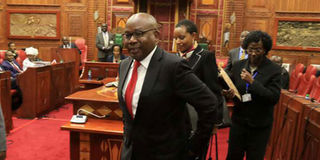Breaking News: At least 10 feared to have drowned in Makueni river
Conflicting role of attorney-general

Attorney-General Githu Muigai appearing before joint parliamentary select committee on the Independent Electoral and Boundaries Commission at Parliament Buildings on July 20, 2016. PHOTO | JEFF ANGOTE | NATION MEDIA GROUP
What you need to know:
Though he sits in the Judicial Service Commission (JSC), which along with the Law Society of Kenya had successfully challenged amendments to the law before the High Court, Prof Githu Muigai last week filed an application to overturn the same.
- Offensive amendments to the Judicial Service Act that were nullified by High Court on May 26 required the JSC to forward names of three candidates out of whom president would appoint the Chief Justice and Deputy Chief Justice.
The position of the attorney-general as a member of the Judicial Service Commission (JSC) is worrying as the Appellate Court begins the hearing of an appeal that seeks to return to the president powers to pick the next Chief Justice.
Though he sits in the commission, which along with the Law Society of Kenya had successfully challenged the amendments to the law before the High Court, Prof Githu Muigai last week filed an application to overturn the same decision.
The hearing is scheduled to start tomorrow at the Court of Appeal after the attorney-general obtained certification from the court that the application is urgent.
The offensive amendments to the Judicial Service Act that were nullified by the High Court on May 26 required the JSC to forward names of three candidates out of whom the president would appoint the Chief Justice and Deputy Chief Justice.
Besides the clash of roles by Prof Muigai, the timing of the application is equally suspect, coming just two weeks before the JSC starts interviewing candidates for the Chief Justice, Deputy Chief Justice and a Supreme Court judge.
The AG’s application to nullify the High Court ruling comes after more than two months of inaction by the Executive, which had pushed through the amendments in Parliament.
However, Acting JSC Chairperson Margaret Kobia defended the attotney-general, saying he should not be demonised because he was legally executing his mandate as the chief legal adviser to the government.
“Legally, he is the chief legal adviser to the government and Kenyans should also appreciate that we are in a democracy and the courts exist for all of us. That is how we see it. It doesn’t compromise his position in the Judicial Service Commission,” Prof Kobia said.
The JSC has shortlisted six candidates for the position of Chief Justice to replace Dr Willy Mutunga and interviews will start on August 29.
Those who have been shortlisted are Justice Smokin Wanjala, a judge in the Supreme Court, three Court of Appeal judges – Roselyne Nambuye, Alnashir Visram and David Maraga – and Justice Mbogholi Msagha of the High Court.
ONLY CANDIDATE
Lawyer Nzamba Kitonga, who served as the chair of the Committee of Experts on the Constitution, is the only candidate for the position of chief justice who is not a judge.
For the Deputy Chief Justice, the JSC shortlisted 13 candidates while for the Supreme Court judge, there are 18 candidates. The interviews are set for October.
Barring any legal challenges, the JSC will then nominate an individual for each of the three positions to be appointed by President Uhuru Kenyatta.
A stay of the High Court judgment would throw into disarray the ongoing recruitment for the two top positions as the commission would then be required to comply with the provisions of the Judicial Service Act that the High Court had nullified.
The practical consequence of compliance with this provision would be that despite whatever views the JSC might have otherwise had about their suitability for appointment, it would be obliged to send the names of three of the six candidates that it has shortlisted for the position of Chief Justice for consideration.
Similarly, within the JSC, questions are being asked about the apparently conflicting roles that the attorney-general plays as a result of his membership of the JSC while also serving as the legal adviser to the government.
As a JSC member, the attorney-general was party to the decisions of the commission to mount a legal challenge against the disputed provisions.
At the same time, the AG, as the key legal adviser to the government, has been party to the decision to oppose the suit by the JSC, against which his office has now filed an appeal that is now set for hearing. Sources indicate that the revived interest in the appeal against the High Court judgment is part of a wider strategy by the executive to seek more control over the process of appointing the next Chief Justice. One view is that the political establishment is unhappy with the shortlisted candidates and would ultimately like to scuttle the on-going recruitment process with a view to buying that would allow it to reorganise its house.
Another view is that the establishment is anxious about who of the six candidates the JSC will end up shortlisting. With a view to maximising on a favourable candidate being shortlisted, the attorney-general is seeking a reversal of the decision of the High Court.





